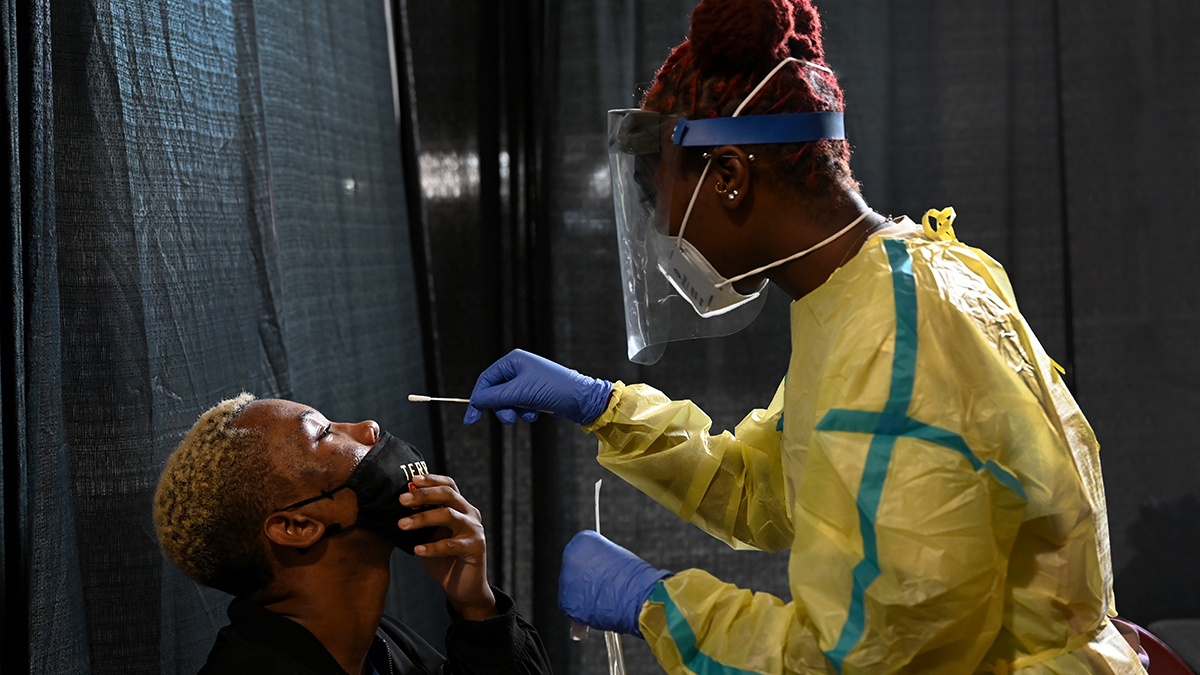The country is set to take a major step toward distributing a safe and effective coronavirus vaccine Thursday morning when a Food and Drug Administration advisory panel meets to review research on Pfizer’s shot.
Regulators have already given an early look at the research. The biggest headlines are the vaccine appears safe and it looks to be even more effective than doctors first thought.
We're making it easier for you to find stories that matter with our new newsletter — The 4Front. Sign up here and get news that is important for you to your inbox.
Progress toward widespread vaccination is encouraging news as the virus data points to a deepening crisis. Virginia reported more coronavirus cases on Wednesday than any other day of the pandemic, 3,387.
Hospitalizations in Maryland and Virginia have reached record-highs.
Once Pfizer’s vaccine is available, anyone getting it will need to receive two doses.
“There’s some protection in receiving that first shot, but the second shot, taken 28 days later, is needed to get that nearly-full protection from COVID-19,” NBC News Medical Correspondent Dr. John Torres says.
Distribution of a vaccine could first begin in the D.C. area as early as next week, so long as regulators find a vaccine safe and effective.
Gov. Larry Hogan laid out the crucial first steps for Maryland in a press conference Tuesday.
Maryland's first shipment will contain 155,000 vaccines from Pfizer and Moderna. There could be another shipment by the end of the year, bringing the total number of vaccines to the state to 300,000.
Under a new order from the Maryland Department of Health, any health care professional will be able to administer the vaccine with the right training and supervision.
Hogan and his lieutenant governor will take the vaccine publicly to build trust.
But Hogan warns the first wave of vaccinations won’t end the pandemic. Cases could continue rising for months.
“It’s often said that it’s always darkest before dawn,” Gov. Hogan said. “It is clear that our worst days of this pandemic are still yet to come, in the weeks and months ahead.”
Health care workers, long term care residents and staff, and first responders will be the first to receive the vaccine. After that, it's high-risk individuals, followed by essential workers and medium-risk individuals. After those groups get access, the vaccine will be made available to the general public.
A challenge for any new vaccine is convincing the public that it’s safe, which can be a tough sell, especially in minority communities.
One Montgomery County group has been working to build confidence by working with local lawmakers, churches and Black physicians to get the conversation started.
Beatrice Miller, co-chair of African American Health Program Executive Committee (AAHP) in Montgomery County, says it’s important to focus on vaccinating the Black community.
“We’re dying from COVID,” Miller said. “That’s really going to be the message: We really need to start embracing the technology.”
Here’s more on vaccination plans in Virginia and D.C.
Contact tracers in Virginia can't keep up during the current surge in COVID-19 cases, pushing the state health department has set new priorities for those tracers.
Contact tracers will focus on reaching those who just recently tested positive and their household contacts, those in congregate living facilities or in known outbreaks and those who have an increased risk of severe illness.
Health officials say that means those who test positive shouldn’t wait for a call from a contact tracer to take action.
If you may have been exposed, self-isolate, monitor yourself for symptoms, contact your health care provider and try to schedule a test.
Montgomery County will give away hundreds of “Covid kits” Thursday to its hardest hit communities. They include hand sanitizer, gloves, masks and thermometers.
Thursday’s distribution will start at 11 a.m. at the Oak Chapel United Methodist Chuck in Silver Spring.
During the county’s first distribution on Tuesday, a long line formed, and officials quickly ran out of kits.
The District is ramping up its COVID-19 testing and there are some changes in how you register.
The D.C. COVID-19 Response Team says it has seen an increase demand for testing before and after Thanksgiving.
To keep up the demand, D.C. leaders contracted with a new lab to handle testing at Judiciary Square and Nationals Park.
You are encouraged to pre-register online to get tested. The online system now asks you for proof of insurance or a picture of a government issued ID.
If you don't have either document, you can still get tested at any of the D.C. sites. Just allow more time to get registered.
The city’s goal is to keep test turnaround times to 3-5 days, health officials say.
Thousands of Wi-Fi hot spots are coming to students in Prince William County Public Schools.
Over 4,000 Wi-Fi hot spots will be distributed to students without reliable internet access after the Board of County Supervisors received $1.2 million to buy the devices.
Students at the University of Maryland in College Park will continue hybrid learning into the spring semester.
University President Darryll Pines says about 25% of courses will be held in person. The remaining courses will be online.
Before students return to campus, they’ll also need to test negative for coronavirus. Students, faculty and staff will be required to take a COVID-19 test every two weeks.
What the Data Shows
Gov. Larry Hogan announced Tuesday that Maryland came first in the nation for contact tracing participation with 1.2 million people opting in to the MD COVID Alert app.
From June 15 to Dec. 5, a total of 139,506 cases with a phone number have been entered into Maryland’s contact tracing database. Of the total cases, 80.7% were successfully contacted and 55.6% named at least one person they had been in close contact with.
Among those exposed to COVID-19 and entered into the database from July 10 to Nov. 14, 43% went to one or more high-risk locations, 29% did not go and 28% were nonresponsive.
The most prevalent high-risk areas included working outside the home (56.9%) and indoor shopping (36.6%).
In D.C., 75.5% of all positive cases completed an interview with the District’s contact tracing team. The exposure notification system has 464,330 participants as of Dec. 7. Those interviewed provided an average of 1.2 contacts.
As of December 8, there are a total of 882,414 downloads of Virginia's contact tracing app COVIDWISE, according to Public Information Officer Melissa Gordon.
"It's estimated that 21% of Virginians, ages 18-65 with a smartphone, have downloaded the app," she wrote in an email to News4.
"10,446 likely exposure notifications have been sent to app users. The 5-day average ending on 12/8 is 78 notifications/day."
According to the Virginia Department of Health, 13,259 contacts are currently under public health monitoring.
Virginia recorded the largest single-day increase in confirmed coronavirus cases ever. The state reported 3,387 new cases and 19 deaths.
D.C. had an additional 265 cases and 3 deaths. Maryland reported 2,692 cases and 46 deaths.
Hospitalizations in Maryland (1,653) and Virginia (1,715) have both broken new records. In D.C. 203 people are currently hospitalized – nearly 40 more people than a week prior.
Vaccination Plans in DC, Maryland, Virginia
- Virginia: The Virginia Department of Health estimates there are up to 500,000 health care workers and long-term care facility residents in the state who are among top-priority for vaccines. The state announced Friday that 480,000 doses of vaccine from Pfizer and Moderna could arrive by the end of December.
“We will focus initially on the groups that have been most at risk for severe illness from COVID-19 infections and those whose work puts them at greatest risk of contracting COVID-19 infections," Virginia State Health Commissioner Dr. M. Norman Oliver said. - Maryland: Maryland will focus its initial COVID-19 vaccinations on hospital-based health care workers, residents of nursing homes and first responders.
The state is expected to receive 155,000 initial doses of COVID-19 vaccines, and distribution could begin as early as next week for the Pfizer vaccine and later this month for the Moderna vaccine. That initial figure includes 50,700 Pfizer doses and 104,300 Moderna doses. - Washington, D.C.: The U.S. Department of Health and Human Services and Operation Warp Speed are planning to give 8,000 doses to D.C. in an initial distribution once a vaccine is available, D.C. Health Director Dr. LaQuandra Nesbitt said Monday. That’s just one-tenth of the estimated 80,000 doses needed to cover health workers, she said.
Health care workers and first responders will top D.C.’s list for who will get a COVID-19 vaccination once it’s available, Nesbitt said.
Local Coronavirus Headlines
- Health officials in Virginia say they'll likely have to scale back on contact tracing because coronavirus transmission levels are rising so high.
- Maryland will focus its initial COVID-19 vaccinations on hospital-based health care workers, residents of nursing homes and first responders in the first phase expected to arrive as soon as next week, state officials said Tuesday.
- If federal regulators authorize two COVID-19 vaccine candidates, Virginia expects to receive enough doses by the year's end to begin inoculating nearly all of its health care workers and long-term care facility residents, officials said Friday.
- Help is available for thousands of D.C. residents who have fallen behind on rent payments.
- D.C. Public Schools is preparing for an ambitious pilot program in which it will regularly test some students and staff for the coronavirus.
- The initial wave of vaccines likely won’t come close to covering all health care workers in D.C., Maryland and Virginia.
- Despite rising COVID-19 cases in the D.C. region, thousands of Northern Virginia students returned to the classroom Tuesday and began hybrid learning.
- Maryland Gov. Larry Hogan announced measures on Tuesday to boost the number of available health care workers and plan for more hospital beds.
- Thousands of Northern Virginia students returned to classrooms in Loudoun and Prince William counties to begin hybrid learning.
- Some Fairfax County students have returned to all-virtual learning amid a rise in coronavirus cases.
- COVID-19 numbers continue to paint a dire picture for Black Americans, and there is an ongoing effort in the Black community to increase testing.
- Officials reversed a decision to cancel the annual Wreaths Across America event at Arlington National Cemetery. The event, held in December, will happen after all.
- Maryland released a new contact tracing app, and has reduced indoor operations for bars and restaurants from 75% to 50% in response to rising coronavirus cases and increased hospitalizations.
Reopening Tracker
- Maryland tightened restrictions on businesses, bars and restaurants.
- All Smithsonian museums and the National Zoo closed because of rising COVID-19 cases, officials announced.
- Hours before some Fairfax County students were set to return to in-person learning, the school district said that they needed to delay the plan.
- Courts throughout Maryland partially shut down due to the pandemic.
- Virginia announced new measures to fight COVID-19 as cases of the virus have spiked across the country.
- Prince George's County tightened restrictions and required masks to be worn outdoors.
- Montgomery County reduced capacity limits at many businesses, including for indoor dining, to 25%. The county previously stopped giving waivers for alcohol sales after 10 p.m.
- D.C.'s mayor extended the city's coronavirus state of emergency to last through the end of the year.
How to Stay Safe
There are ways to lower your risk of catching coronavirus. Here are guidelines from the CDC:
- Wear a snug-fitting mask that covers your nose and mouth.
- Avoid being indoors with people who are not members of your household. The more people you are in contact with, the more likely you are to be exposed to COVID-19. If you are indoors with people you don’t live with, stay at least six feet apart and keep your mask on.
- Wash your hands often, especially after you have been in a public place.



